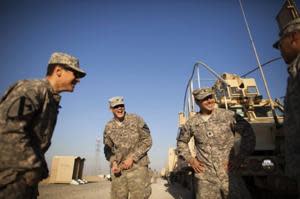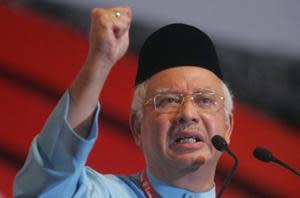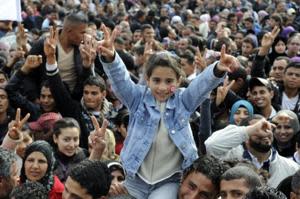The Year in Review: Politics
The first year of the second decade in the 21st century was indeed eventful, with protests being the buzz word as dictatorial regimes tumbled and politicians - both at home and abroad - faced off against a more savvy and critical public.
Some leaders were deposed or even killed after leading their countries for decades with iron fists. Others refused to take responsibility for scandals that were simply unconscionable. And then there were those who were literally caught with their pants down.
Of course, having to go through the entire stack of stories over the course of 12 months would be overwhelming to say the least. That's why we've decided to narrow the list down to what we think are the most notable events, in ascending order, for the year 2011 starting with;
10. The National Feedlot Corporation scandal
Here is a situation that has even the most die-hard Barisan Nasional supporter fuming. In a nutshell, the husband of Women, Family and Community Development Minister Sharizat Jalil was granted a RM250 million loan to boost Malaysia's beef self-sufficiency. Despite the government's assurances, it is seen as a failure.
The controversy however came with the purchase of two RM6.9 million luxury condominiums as "investments", sparking public outrage and demands for Sharizat's resignation over the fiasco, even from her Umno colleagues. She hasn't quit, and this issue is expected to continue to hang over the ruling coalition's head into the following year.
9. Anwar Sex Video
If facing a second sodomy trial was not damaging enough, a trio of politicians - dubbed Datuk T - organised an elaborate and secretive screening of a sex video at a posh hotel in the city, claiming that the opposition leader was allegedly caught red-handed having a go at a working girl.
Anwar, his family, and his supporters in PKR, and to a certain extent the Pakatan Rakyat coalition, have vehemently denied the allegations. But while they claim this has not dented his public persona, the bigger question that remains is whether or not this has shaken the belief of those close to the "god-sent" leader.
8. US pullout from Iraq
The withdrawal of US troops from war-ravaged Iraq in mid-December has been hailed as a new dawn for the Middle-Eastern country, with media reports claiming that Iraqis are optimistic of a brighter future ahead for them.
While the pullout marks the end of nearly a decade of American occupancy, the country still faces the mountainous problem of a nascent "open democracy" that was implemented by a bunch of people who simply did not - and possibly still do not - get Iraq. Only time will tell if the Iraqis will learn to cope with this new paradigm in their existence, or end up falling apart like Afghanistan.
7. Kim Jong Il
The death of the North Korean dictator spurred a global outpouring of hope and expectation that the communist country would now consider taking the "path of peace" as it faces the task of replacing their "Dear Leader".
It is expected that North Korea will likely seek continuity to the Kim lineage, with his son, Kim Jong Un touted by state-owned media as the "Great Successor". Not much is known of the successor, who is thought to be 27 years old, though there is speculation that he will continue on the path set by the elder Kim, who died of a heart attack aged 69.
6. Hasan Ali
Here's one man who has managed to piss off so many people, that he merits an entry all on his own.
The former Pas Selangor commissioner has been making the front page on various occasions over the course of the year, not least for the controversial "inspection" by religious officials on the Damanasara Utama Methodist Centre for alleged proselytisation of Muslims, and also claims that this extended to the use of solar-powered talking bibles.
He capped the year by getting into a prolonged tussle with fellow Pas leaders for pushing a revival of unity talks between Pas and bitter political enemies Umno, making sure he starts the New Year fresh in the public consciousness.
5. Umno General Assembly
Since we're on the subject of Umno and Pas, we can't leave out this year's Umno General Assembly, which ended up being a platform for party leaders to bash Pakatan Rakyat partners Dap and Pas for forming what they alluded to being an unholy alliance for the sake of national power.
Taking their standard antagonistic and decidedly racial position, Umno attempted to stir the sentiments of the Malays - who form the voting majority - against the opposition by painting Pas, a direct competitor for Malay and Muslim support, as a lapdog of the Chinese-centric Dap.
4. Silvio Berlusconi
When it rains, it pours, and that would probably best sum up the year for the disgraced former Italian Prime Minister.
Earlier in the year, he was wracked by a sex scandal involving an under-aged belly dancer at infamous "bunga bunga" parties. "Il Cavaliere" or The Knight eventually bowed out of office in November in the midst of an acute debt crisis affecting Italy - an element of the wider Eurozone crisis threatening to sink the European Union.
3. Prime Minister Najib Razak's reform promises
Despite the government's strong-arm response to the Bersih 2.0 rally in July, it looks like it made more of an impact than the Barisan Nasional would care to admit.
The proof was in Najib's Malaysia Day announcements, where he declared a raft of reforms which included the decision to repeal the controversial Internal Security Act and the lifting of decades-old emergency declarations.
This however was not enough for his detractors, who accused the Prime Minister of simply pushing piecemeal efforts that failed to address fundamental problems plaguing the country.
2. EO6
Arguably one of the more influential spin-offs from the Bersih 2.0 rally was the public outrage that followed the arbitrary arrests of six Parti Sosialis Malaysia (PSM) leaders under the Emergency Ordinance.
This was a case where the authorities did everything they shouldn't have, where they tried - but ultimately failed - to pin allegations of communist propaganda on the EO6, as he group are known. The authorities ultimately dropped the charges against them, effectively handing them hero status, at least in the eyes of their prospective voters.
1. Arab Spring
Though this was sparked by an act of self-immolation by a petty trader in Tunisia in December last year, the effects spread like wildfire leading to the deposition of a slew of dictators and autocrats in the Middle East.
Being the place where it all began, Tunisia was the first to see its long-term president, Zine al-Abidine Ben Ali, step down in January. Following him was Egyptian president Hosni Mubarak in February, and then Libyan leader Muammar Gaddafi was forced out of power and eventually killed by rebels in October while he reported attempted to escape.
The latest addition to the list was Yemeni president Ali Abdullah Salehs, who stepped down in November in exchange for immunity from prosecution. Syrians also joined in the Arab Spring, but are still battling with their government, which is blamed for a bloody campaign to stamp out anti-establishment protesters.











